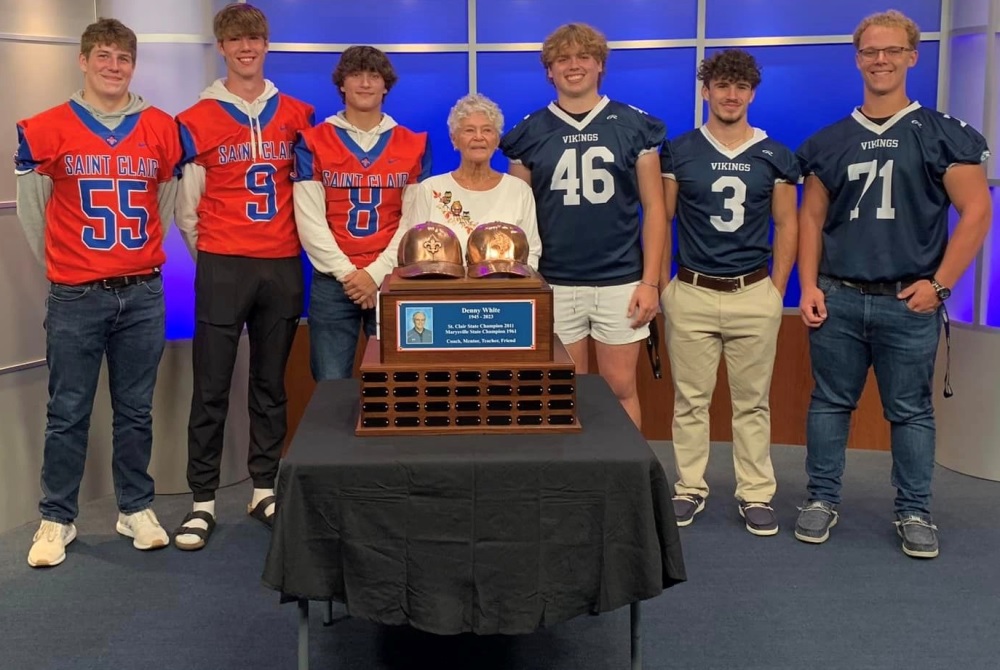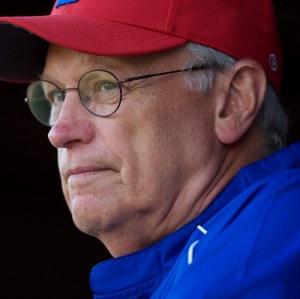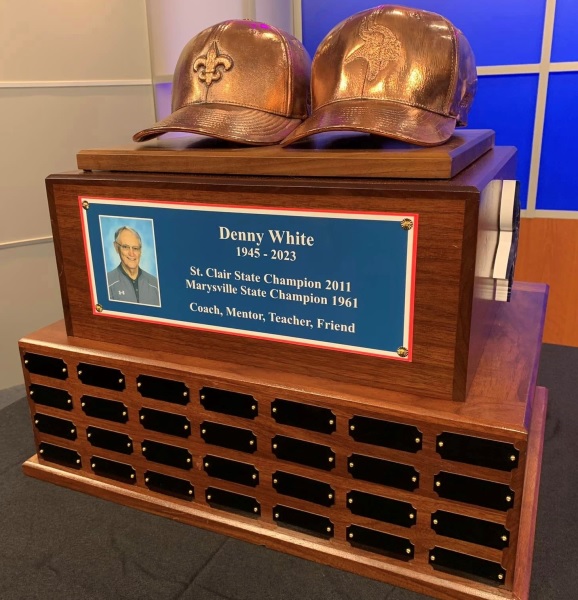
'Hearts' Focus Includes Action Planning
November 12, 2015
By Geoff Kimmerly
Second Half editor
As most of Michigan’s high school athletes move inside this month for the start of winter sports, many will take part in a program introduced to Michigan High School Athletic Association member schools this fall that assists coaches and students in preparing for the possibility of a health emergency during their after-school practices and events.
Prior to the start of this 2015-16 school year, the MHSAA sent every member school the “Anyone Can Save a Life” emergency action plan authored by the Minnesota State High School League and the Medtronic Foundation. The program instructs schools to assemble teams made up of coaches and their students that will act in the event someone suffers sudden cardiac arrest or another emergency medical situation.
“Anyone Can Save a Life” suggests a game plan that establishes four teams on every level of every sport in a school – a 911 Team, CPR (cardiopulmonary resuscitation) Team, AED (automated external defibrillator) Team and Heat Stroke Team. The groups are made up of coaches and their students who will be in close proximity to all after-school activities.
It’s another valuable tool as the MHSAA begins work on the fourth piece of its eight-year “4 H’s” health and safety emphasis. The next two school years focus on Hearts to go with efforts over the last six years centered on Health Histories, Heads and Heat issues faced by MHSAA athletes. This fall, for the first time, all varsity head coaches at MHSAA member schools were required to have CPR certification – another means by which athletic personnel can work to counter the random, unpredictable nature of sudden cardiac arrest.
“There is something we can do. We can be prepared. We can develop emergency plans, display AEDs and deliver CPR. And, like any good sports teams, we need to practice our preparations,” MHSAA Executive Director John E. “Jack” Roberts said. “’Anyone Can Save a Life’ can help schools revise or revitalize their existing emergency plans in ways that engage team members in planning, practice and execution. This could help save lives now and also convey important lifelong life-saving lessons to students involved on these teams.”
Students are a vital component to having a successful emergency action plan. They will be put in position to call 911, meet the ambulance at a pre-determined access point, locate the nearest AED, make sure immersion tubs are filled for hot-weather practices, and for those who are trained, to assist with CPR. Coaches identify students at the beginning of the season and prior to an emergency taking place, and provide them with the details of the job they are assigned so they will be ready to assist in the event of an emergency.
The “Anyone Can Save a Life” plan was sent to schools nationwide with assistance from the National Federation of State High School Associations and the NFHS Foundation. Click for information on "Anyone Can Save a Life."
“The ‘Anyone Can Save a Life’ initiative promotes the need to have and to practice planning for different kinds of emergencies,” Roberts said. “The result can be a fresh, comprehensive emphasis on preparing for emergencies well before they occur and then responding with more confidence when those emergencies inevitably happen. It is the perfect link between the last two years when we focused on heat illness and the next two years when we focus on sudden cardiac arrest.”
This fall’s focus on “Hearts” began in the wake of 122 Michigan schools receiving recognition this spring as HEARTSafe by the Michigan Department of Health and Human Services, Michigan Department of Education, American Heart Association, Michigan Alliance for Prevention of Sudden Cardiac Death of the Young and the MHSAA.
Public Act 12 of 2014 requires all schools (grades kindergarten to 12) to have a cardiac emergency response plan in place. This MI HEARTSafe School designation recognizes 122 schools that have taken steps above and beyond to prepare to respond in the event of a cardiac emergency, and is awarded for a period of three years.
In order for a school to receive MI HEARTSafe designation, it must perform at least one cardiac emergency response drill per year, have a written medical emergency response plan and team, have current CPR/AED certification of at least 10 percent of staff, have accessible, properly maintained and inspected AEDs with signs identifying their location, and ensure pre-participation sports screening of all student-athletes using the current physical and history form endorsed by the MHSAA.
Schools that meet all requirements are able to apply for the MI HEARTSafe School designation each year. Click for information and for a list of designated schools.

Marysville, St. Clair Join Together to Honor Beloved Coach with Rivalry Trophy
By
Paul Costanzo
Special for MHSAA.com
October 11, 2023
Denny White brought quite a bit to the Marysville and St. Clair communities.
 In 1961, as a junior in high school, White was part of the first team to bring a football state title to Marysville.
In 1961, as a junior in high school, White was part of the first team to bring a football state title to Marysville.
Fifty years later, as an assistant coach, he played a vital role in bringing St. Clair its first MHSAA Finals title in baseball.
During the years in between, and decade after, White brought his knowledge of and passion for those sports to hundreds of student athletes.
But most recently, he brought the two communities together.
This past Friday night, the rival schools played for the Denny White Trophy, an award created to honor the late coach and connect the two communities where he was most revered.
“I’m so happy with all the support that has been around the project,” said Brady Beedon, a family friend who helped to create the trophy and was in the booth calling Friday night’s game for Get Stuck On Sports. “It’s the least we could’ve done for a man who helped so many athletes. His legacy deserves to be preserved.”
In a fitting tribute to White, who died Jan. 22 of this year following a long battle with cancer, the two teams played a hard-fought game at East China Stadium, with White’s alma mater Marysville coming away with a 25-20 victory.
Both teams featured players who had been coached by White at some point in one or both of the sports, as his time on the bench lasted through the fall of 2022.
 That season, he coached the JV B football team at Marysville. Most recently before that, he had been the varsity baseball coach at St. Clair from 2015-21.
That season, he coached the JV B football team at Marysville. Most recently before that, he had been the varsity baseball coach at St. Clair from 2015-21.
“Not much can unify rivals, but Coach White’s influence goes beyond that rivalry,” Marysville football coach Derrick Meier said at a press conference unveiling the trophy. “He’s affected thousands of local athletes. … It is awesome that someone had such an influence across the board with all local athletes (in multiple) sports. I contacted him my first year coaching varsity, and he was not willing to leave where he was at. I called him three subsequent years; he graciously declined. The last year he did accept, we added a JV B team, his wisdom and knowledge went well beyond just coaching on the field. We’re all lucky for his influence.
“Heroes get remembered. Coach White will be remembered.”
White was a 1963 graduate of Marysville, who then attended Ferris State and Central Michigan. His coaching journey did not begin in the area where he grew up, however, as he coached baseball and football at Newaygo High School before coming to St. Clair.
He spent 35 years in the Saints athletic program, coaching baseball and multiple levels of football.
Much of his time was spent as the pitching coach for St. Clair for coaches Richie Mallewitz and Bill McElreath. That included the 2011 season, when his pitching staff included current major leaguer Jacob Cronenworth, who now plays second base for the San Diego Padres.
Also on that staff were Joel Seddon, who was drafted twice – once out of high school and again after college – and would go on to be the closer at South Carolina; and Jared Tobey, who pitched at Wayne State and was drafted by the Detroit Tigers, playing four years in their minor league system.
While White coached nearly 1,000 baseball games in his career, he was involved with more than just high school sports. He also coached a 13-year-old Little League team to a state title and the semifinals of the Great Lakes Regional in 2015.
 No matter the level, White poured all he had into coaching, and that included his final season on the sidelines at Marysville, just months prior to his passing.
No matter the level, White poured all he had into coaching, and that included his final season on the sidelines at Marysville, just months prior to his passing.
“Every single kid that he touched with that team, you could just tell, gravitated toward him immediately,” said Travis Disser, who coached with White that final year at Marysville. “His lessons and his light-hearted humor are just something that you can’t replace, or ever hope to. I was lucky enough to learn pitching from Coach White when I was a younger kid, as well. He was the exact same Denny White as he was all those years ago, as he was last year during his battle with cancer. Coach White was a warrior in every sense of the term. His lessons, both on the field and off the field from him, are something that I’ll never, ever forget.”
The idea to create the trophy honoring White came about not long after his death, as Beedon worked with Meier, former St. Clair athletic director Denny Borse and St. Clair assistant football coach T.J. Schindler to create and design the trophy.
The final product is a two-tiered trophy topped with a pair White’s hats – one from St. Clair, the other from Marysville – that have been bronzed. It includes the years in which he won his state titles at his respective schools, and a passage about his life. There is also room to list the yearly winners, as it is planned to represent the rivalry and shared respect for White in the two communities for years to come.
“Whether it was Little League kids over the last 20 years, or some of the football players and baseball players that he coached over the decades that he coached, all of them when they get together have great stories and fondness for all the memories that (White and his fellow coaches) helped them create,” said Sandy Rutledge, the current St. Clair athletic director and a longtime friend and colleague of White. “I think it’s awesome that now as we play for this trophy every year, it will give our coaches a chance to kind of explain who Coach was. The next generation, maybe they didn’t even know him, will know that he is a legend, and he’ll always be remembered.”
 Paul Costanzo served as a sportswriter at The Port Huron Times Herald from 2006-15, including three years as lead sportswriter, and prior to that as sports editor at the Hillsdale Daily News from 2005-06. He can be reached at [email protected] with story ideas for Genesee, Lapeer, St. Clair, Sanilac, Huron, Tuscola, Saginaw, Bay, Arenac, Midland and Gladwin counties.
Paul Costanzo served as a sportswriter at The Port Huron Times Herald from 2006-15, including three years as lead sportswriter, and prior to that as sports editor at the Hillsdale Daily News from 2005-06. He can be reached at [email protected] with story ideas for Genesee, Lapeer, St. Clair, Sanilac, Huron, Tuscola, Saginaw, Bay, Arenac, Midland and Gladwin counties.
PHOTOS (Top) From left: St. Clair’s Larry Wawryzniak, Liam Nesbitt and Peyton Ellis, Denny White’s wife Karen White, and Marysville’s Bryce Smith, Carter Saccucci and Caz Carty stand with the first-year traveling trophy celebrating Denny White’s coaching career. (Middle) White was a mainstay in the area’s sports community for more than six decades. (Below) The trophy celebrates his contributions to both schools and will list the winners of their annual football game. (Trophy photos courtesy of Brady Beedon. Headshot courtesy of the White family.)

